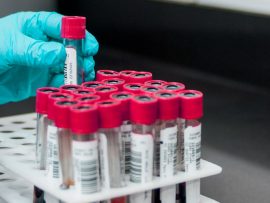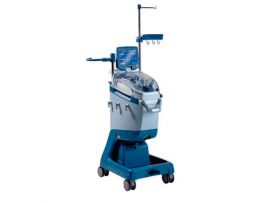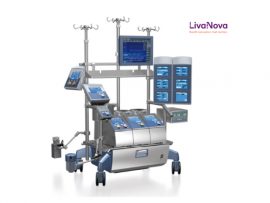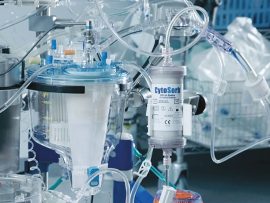Abstract Background Evidence-based recommendations for transfusion in patients with venoarterial extracorporeal membrane oxygenation (VA ECMO) are scarce. The current literature is limited to single-center studies with small sample sizes, therefore..
Read MoreAbstract Objective Despite inherent comorbidities, obese cardiac surgical patients paradoxically had shown lower morbidity and mortality, although the nature of this association is still unclear. Thus, the authors intended in..
Read MoreAbstract Objectives Viscoelastic assays, such as rotational (ROTEM), are used increasingly in cardiac surgery to guide transfusion decisions. After separation from (CPB), achieving rapidly is the main goal before chest closure. The authors hypothesized..
Read MoreAbstract OBJECTIVES: This narrative review article seeks to highlight the effects of citrate on physiology during massive transfusion of the bleeding patient. DATA SOURCES: A limited library of curated articles..
Read MoreAbstract ABO blood group has been shown to be a major determinant of plasma von Willebrand factor (vWF) levels. O blood group is associated with the lowest vWF levels and..
Read MoreAbstract Aim: In current practice, fast-track protocols are gaining importance in patients undergoing cardiac surgery. For this purpose, besides different application techniques, biomarkers are frequently examined in the peri-operative period...
Read MoreAbstract Background Bleeding and thrombosis induce major morbidity and mortality in patients under extracorporeal membrane oxygenator (ECMO). Circuit changes can be performed for oxygenation membrane thrombosis but are not recommended..
Read MoreAbstract Cold agglutinin disease is a type of autoimmune haemolytic anaemia caused by autoantibodies that bind to red blood cell antigens at a cold temperature and causes extravascular haemolysis and..
Read MoreAbstract Background Thrombocytopenia, hemorrhage and platelet transfusion are common in patients supportedwith venoarterial extracorporeal membrane oxygenation (VA ECMO). However, current literature is limited to smallsingle‑center experiences with high degrees of..
Read MoreAbstract Artificial intelligence has the potential to improve the care that is given to patients; however, the predictive models created are only as good as the base data used in..
Read MoreAbstract Introduction Cardiac output (CO) is a key determinant of oxygen delivery. Low cardiac output syndrome (LCOS) causes organ dysfunction, prolonged hospital stay, and reduces survival in perioperative settings and..
Read MoreAbstract Aim Aim of this study was to describe and analyse associations of incidents and their improvement actions in hospital setting. Methods It was a retrospective document analysis of incident reporting systems’..
Read MoreAbstract With the implementation of the new allocation system in the United States on October 18, 2018, patients requiring temporary mechanical circulatory support (tMCS) have the highest priority, a shorter..
Read MoreAbstract Background: The use of autologous blood transfusion in digestive tract surgeries, whether after preoperative blood collection or intraoperative blood salvage, is an alternative to allogeneic blood, which brings with..
Read MoreAbstract Objective There are no reports from Japan showing the effects of using the thromboelastography algorithm on transfusion requirements after Intensive Care Unit (ICU) admission, and post-implementation knowledge regarding the..
Read MoreAbstract Sickle cell disease (SCD) is a collection of inherited hemoglobin disorders that results in chronic hemolytic anemia, vaso-occlusion, pain, and end organ damage. Surgery in the SCD population requires..
Read MoreAbstract Objective This study aimed to investigate the blood protective effect of autologous platelet-rich plasma in aortic root reconstruction under longtime cardiopulmonary bypass. Method Patients who underwent aortic root reconstruction..
Read MoreAbstract Cardiopulmonary bypass is an integral and indispensable part of surgical repair of congenital heart defects. While the complications and morbidity secondary to the use of cardiopulmonary bypass has decreased..
Read MoreAbstract Objectives Viscoelastic tests allow a reduction in blood product transfusion. Three modern devices are currently available (rotational [ROTEM] sigma, [TEG] 6S, and Quantra). No study has compared the performances of these..
Read MoreAbstract Pediatric Literature As the practice of ultrafiltration arose from pediatric cardiac surgery, much of the evidence to support MUF is from low-powered pediatric studies. Some early, single-center literature, as..
Read MoreAbstract Hemodilution and Volume Overload The use of CPB necessitates priming of the CPB circuit, which is typically accomplished using 1-to-2 liters of a crystalloid solution. In addition, 1-to-3 liters..
Read MoreAbstract Introduction Despite the increasing amount of evidence supporting its use, cell salvage (CS) remains an underutilized resource in operative trauma care in many hospitals. We aim to evaluate the..
Read MoreAbstract Hemotherapy is the treatment of diseases by the use of blood or blood products from blood donation (by others of for oneself). It is clear that blood components transfusion..
Read MoreAbstract Background This study aimed to assess contemporary knowledge, attitudes and behaviors around transfusion of intraoperative salvaged blood (sRBCt) during hepato-pancreatico-biliary (HPB) operations. Findings are meant to inform the design..
Read MoreAbstract Background The purpose of this study was to analyze the results of Cytosorb (CytoSorbents, Monmouth Junction, NJ) adsorption during emergency open heart operations in patients at high risk of..
Read MoreAbstract Background: Ultrafiltration is used with cardiopulmonary bypass to reduce the effects of hemodilution and restore electrolyte balance. We performed a systematic review and meta-analysis to analyze the effect..
Read MoreAbstract Objective This study aims to compare the efficacy and safety of activated recombinant factor VII (rFVIIa) and prothrombin complex concentrate (PCC) in the treatment of bleeding complications following surgery..
Read MoreAbstract Background Fibrinogen γ-chain peptide-coated, adenosine 5'-diphosphate (ADP)-encapsulated liposomes (H12-ADP-liposomes) are potent hemostatic adjuvants that promote platelet thrombi formation at bleeding sites. Although we have reported the efficacy of these..
Read MoreAbstract BACKGROUND: We analyzed bleeding and thrombotic complications in COVID-19–associated ARDS requiring extracorporeal membrane oxygenation (ECMO). METHODS: This was a single-center observational study of adult subjects undergoing ECMO for COVID-19 (n = 67)..
Read MoreAbstract Background Cell salvage reduces allogenic blood transfusion requirements in surgery. We present a pilot study exploring the impact of anticoagulant choice, citrate or heparin, on the quality of cell..
Read More













